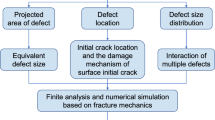Abstract
It is well understood that the fatigue limit behavior of a metal is a function of defect size within the Linear Elastic Fracture Mechanics (LEFM) regime. Conversely, it is not well understood how microstructural defects affect the fatigue limits of heterogeneous materials of apparently smooth specimens and engineering components. Consequently in the latter case investigations have concentrated on the cyclic stress-strain, or deformation, approach to fatigue fracture e.g. the Basquin and Coffin-Manson type studies.
By introducing micro-structural fracture mechanics and elastic-plastic fracture mechanics it is possible to link the deformation and the fracture approaches to metal fatigue investigations. This chapter considers these developments and their implications.
Access this chapter
Tax calculation will be finalised at checkout
Purchases are for personal use only
Preview
Unable to display preview. Download preview PDF.
Similar content being viewed by others
References
Akid, R. (1987). The initiation and growth of short fatigue cracks in an aqueous saline environment. PhD thesis, University of Sheffield. 28.
Akid, R. and Miller, K. J. (1990a). The initiation and growth of short fatigue cracks in an aqueous saline environment. In Scott, P. and Cottis, R. A., editors, Environment Assisted Fatigue, EGF publication 7. Mechanical Engineering Publications, London.
Akid, R. and Miller, K. J. (1990b). The effect of solution ph on the initiation and growth of short fatigue cracks. In Fracture Behavior and Design of Materials and Structures, pages 1753–1758. EMAS, London.
Allen, N. P. and Forrest, P. G. (1956). The influence of temperatures on the fatigue of metals. In Fatigue of Metals, pages 327–340, London. Institution of Mechanical Engineers, IMechE/ASME.
Brown, M. W. and Miller, K. J. (1973). A theory for fatigue failure under multiaxial stress-strain conditions. In Proc Instn Mech Engrs, pages 745–755.
Brown, M. W. and Miller, K. J., editors (1989). Biaxial and Multiaxial Fatigue, EGF publication 3. Mechanical Engineering Publications.
de los Rios, E. R., Mohamed, H.J., and Miller, K. J. (1985). A micro-mechanics analysis for short fatigue crack growth. Fatigue Fract Engng Mater Struct, 8:49–63.
Forsyth, P. J. E. (1961). A two-stage process of fatigue crack growth. In Symposium on “Crack Propagation”, pages 76–94, Cranfield.
Frost, N. E. and Phillips, C. E. (1956). Studies in the formation and propagation of cracks in fatigue specimens. In Metal Fatigue, pages 520–526, London. Institution of Mechanical Engineers, IMechE/ASME.
Hammouda, M. M. and Miller, K. J. (1979). Elastic-plastic fracture mechanics analyses of notches. In ASTM STP 668, pages 703–719. American Society for Testing and Materials.
Heyes, P. J. (to be published, 1991). Fatigue cracks at notch roots under high mean stress. PhD thesis, University of Sheffield.
Hobson, P. D. (1985). The growth of short fatigue cracks in a medium carbon steel. PhD thesis, University of Sheffield.
Jacquet, P. A. (1956). Observations on the microstructure of a brass containing 67 percent of copper, subjected to alternating bending stresses. In Fatigue of Metals, pages 50–6509, London. Institution of Mechanical Engineers, IMechE/ASME.
Kitagawa, H. and Takahashi, S. (1976). Applicability of fracture mechanics to very small cracks or the cracks in the early stage. In Proc Second International Conference on Mechanical Behavior of Materials (ICM2), pages 627–631. American Society of Metals.
Kussmaul, K. F., McDiarmid, D. L., and Socie, D. F., editors (1991). Fatigue under Biaxial and Multiaxial Loading, ESIS publication 10. Mechanical Engineering Publications.
Lukas, P., Kunz, L., Weiss, B., and Stickler, R. (1989). Notch size effect in fatigue. Fatigue Fract Engng Metals Struct, 12:175–186.
McClintock, F. A. (1956). The growth of fatigue cracks under plastic torsion. In Proceedings of the International Conference on Fatigue of Material, pages 538–542, London. Institution of Mechanical Engineers, IMechE/ASME.
Miller, K. J. (1985). Initiation and growth rates of short fatigue cracks. In Bilby, B. A., Miller, K. J., and Willis, J. R., editors, Fundamentals of Deformation and Fracture. IUTAM Eshelby Memorial Symposium, Cambridge University Press.
Miller, K. J. (1991). Metal fatigue — past, current and future. The 27th John Player Lecture, Proc Instn Mech Engs.
Miller, K. J. and Brown, M. W., editors (1985). Multiaxial Fatigue, STP 853. American Society for Testing and Materials.
Miller, K. J. and de los Rios, E. R., editors (1986). The Behaviour of Short Fatigue Cracks. Mechanical Engineering Publications, London, egf publication 1 edition.
Miller, K. J. and de los Rios, E. R., editors (to be published, 1991). Short Cracks. Mechanical Engineering Publications, London, an ESIS (EGF) publication.
Navarro, A. and de los Rios, E. R. (1987). A model for short fatigue crack propagation with an interpretation of the short-long crack transition. Fatigue Fract Engng Mater Struct, 10:169–186.
Smith, R. A. and Miller, K. J. (1977). Fatigue cracks at notches. Int J Mech Sci, 19:11–22.
Smith, R. A. and Miller, K. J. (1978). Prediction of fatigue regimes in notched components. Int J Mech Sci, 20:201–206.
Sun, Z., de los Rios, E. R., and Miller, K. J. (1991). Modelling small fatigue cracks interacting with grain boundaries. Fatigue Fract Engng Mater Struct, 14:277–291.
Tanaka, K., Kinefuchi, M., and Yokomaku, T. (to be published, 1991). Modelling of statistical characteristics of propagation of small fatigue cracks. In Short Cracks, ESIS (EGF) publication 12. Mechanical Engineering Publications, London.
Tomkins, B. (1968). Fatigue crack propagation — an analysis. Phil Mag, 18:1041–1066.
Yates, J. R. and Brown, M. W. (1987). Prediction of the length of non-propagating fatigue cracks. Fatigue Fract Engng Mater Struct, 10:187–201.
Zhang, W. (1991). Short fatigue crack behavior under different loading systems. PhD thesis, University of Sheffield.
Editor information
Editors and Affiliations
Rights and permissions
Copyright information
© 1992 Springer-Verlag New York, Inc.
About this chapter
Cite this chapter
Miller, K.J. (1992). Metal Fatigue — A New Perspective. In: Argon, A.S. (eds) Topics in Fracture and Fatigue. Springer, New York, NY. https://doi.org/10.1007/978-1-4612-2934-6_9
Download citation
DOI: https://doi.org/10.1007/978-1-4612-2934-6_9
Publisher Name: Springer, New York, NY
Print ISBN: 978-1-4612-7726-2
Online ISBN: 978-1-4612-2934-6
eBook Packages: Springer Book Archive




